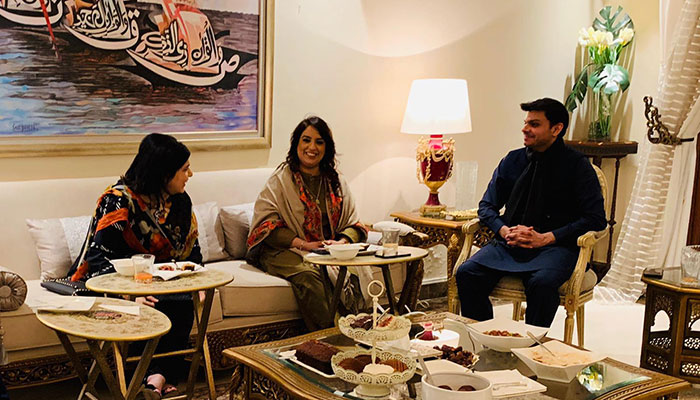British MPs appreciate initiatives by Pakistan government to attract foreign investment
March 24, 2019

LONDON: A group of leading British Parliamentarians have said that Pakistan has a huge potential of economic development and the current trends suggest that the country is on the right course.
These views were expressed by Labour MPs Naz Shah, Faisal Rashid and former cabinet minister and Tory peer Baroness Sayeeda Warsi during their meetings with leading British-Pakistani businessman Jawad Sohrab Malik at his residence in Islamabad.
The British MPs appreciated the initiatives announced by the government of Pakistan to attract foreign investment.
Jawad Malik informed the visiting MPs that Pakistan being the world’s sixth most populated country is also one of the youngest. He said, in the next thirty years, as graying sets in Europe, Pakistan’s median age is projected to be 33 (from a current median age of 24). Pakistan’s economic growth potential resulting from this shift in population’s age structure is huge, he observed.
He conveyed to the MPs that Pakistan is urbanising at an annual rate that exceeds three percent, making it the fastest urbanising country in South Asia. By 2025, half of Pakistan’s population will be living in urban areas and currently 17 million Pakistani households, out of the total 33 million, are considered ‘middle class’ which means that Pakistan’s middle class is rising and pushing up consumer spending.
Malik further remarked, that for the first half of fiscal 2019, United Kingdom has emerged as the second largest foreign investor in Pakistan and it’s also Pakistan’s fifteenth-largest source of imports, and Pakistan-UK bilateral trade hovers around $4 billion a year.
He stated that the current government led by Prime Minister Imran Khan is bent upon improving Pakistan’s ranking in the ‘Ease of doing business’ by making regulations simpler, enhancing protections of property rights and enforcing of contracts. Pakistan with a rising and an urbanising middle class, along with a historical affinity for UK brands and products, opportunities to jumpstart Pakistan-UK bilateral trade are more than plenty.
He added that it was encouraging to see that the UK Export Finance has doubled support for Pakistan to £400 million. Malik told MPs that British companies can take advantage of Pakistan-produced textiles, surgical instruments and sporting goods by integrating Pakistani companies into their supply chains.
The British MPs shared that there is a renewed hope in Pakistan amongst those living abroad. They said that Pakistanis living abroad were also desirous to see genuine change in the country of their origin. They said that Pakistan’s progress was linked with bringing fundamental changes in almost all aspects of the governance. The MPs shared that the democracy, like in Britain and several other European countries, has to be accountable and equitable and that’s the kind of model Pakistan needs to adopt for institutional development.
Labour MP for Bradford West Naz Shah tweeted: “As always, pleasure meeting British Pakistani businessman @JawadSohrab during my visit to Pakistan. Learnt a great deal about the excitement of overseas entrepreneurs to invest in Pakistan as well as their contributions for both British and Pakistani economy #Inspired”.
Faisal Rashid MP said that Pakistan and Britain have a shared future. He tweeted: “It was my pleasure to meet with British Pakistani businessman @JawadSohrab who was very excited about UK Pakistan trade & investment. We must engage with businesses and explore opportunities to benefit both countries. #PakUKFriendship”.
Former Cabinet Minister Sayeeda Warsi said that she was invited by Prime Minister Imran Khan to attend the cabinet meeting for a briefing on how system of governance works. She said that several British Pakistani businessmen were working in Pakistan out of choice because they love their country of origin. “People like Jawad Malik are a credit to Pakistan and the UK.”





